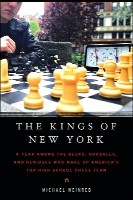All Faculty Excerpts
The Kings of New York
 Gotham Creative Writing teacher Michael Weinreb's new book, The Kings of New York: A Year in Brooklyn With the Oddballs, Geeks and Geniuses Who Make Up America's Top High School Chess Team, was recently released. It’s a narrative nonfiction book that you might call the chess version of Friday Night Lights, the bestseller that spent a year with a high school football team in Texas. The New York Times Book Review says, “The author has a gift for getting into the skin of his characters—moving in with them, in effect—and making them completely sympathetic.” And Chess Life magazine says, “Word for sentence, sentence for paragraph, paragraph for page, The Kings of New York is one of the most readable books about chess ever written.”
Gotham Creative Writing teacher Michael Weinreb's new book, The Kings of New York: A Year in Brooklyn With the Oddballs, Geeks and Geniuses Who Make Up America's Top High School Chess Team, was recently released. It’s a narrative nonfiction book that you might call the chess version of Friday Night Lights, the bestseller that spent a year with a high school football team in Texas. The New York Times Book Review says, “The author has a gift for getting into the skin of his characters—moving in with them, in effect—and making them completely sympathetic.” And Chess Life magazine says, “Word for sentence, sentence for paragraph, paragraph for page, The Kings of New York is one of the most readable books about chess ever written.”Your move: Read an excerpt from the opening of the book.
* * * * * * * * * * * * * * * * * * * * * *
Four days after Christmas, 2004, in a pin-drop silent hotel conference room with a panoramic view of a TGI Friday's and an adult bookstore, Oscar Santana nudges a black pawn forward, sweeps a white rook off the board, and presses the button atop his game clock with a faint click.
“This is not chess,” mutters the man on the opposite side of the board. His name is Norman, according to the pairings board at the Empire City Open, and Norman is regarding Oscar with a slack jaw and a pair of bugged-out eyes. Norman is also wearing a black winter cap indoors, as if to conceal from the outside world the strings that command his puppet-like facial features. “This is not chess,” Norman says again, and he is speaking far too loudly now, his voice piercing the white noise of ticking game clocks and humming air vents and muffled coughs.
Norman is approximately three times Oscar’s age, and a good half a foot taller, and his choice of headwear, coupled with his tics and twitches and grimaces and the plaintive noises he emits through his elastic lips, lends him the appearance of a burglar trying to make an escape through a narrow air shaft. In truth, the board is shrinking on Norman; there are few safe places for his king to escape. His is, as they say in the sport, a lost game, and there is no worse feeling in chess than the realization that defeat is imminent and unavoidable.
Beware if Oscar Santana is sitting across from you at a chess board.
Norman shakes his head and says something utterly incomprehensible. Oscar just sits there, stone-faced, a pair of silver headphones clapped over his ears, a tinny hip-hop beat creeping out from underneath. Then he moves his rook to Norman's back row, to threaten his queen. The queen is the most potent piece on a chess board, the only one capable of moving any number of spaces in any direction, horizontal, vertical or diagonal, and if the queen is crippled, if the queen is retreating instead of attacking … and especially when Norman is already down a rook, because only a pair of rooks can begin to approach the queen in terms of strength … and who the hell is this kid, anyway? Norman has no idea. All he knows is that things have gone wrong, that a moon-faced seventeen-year-old in baggy jeans and FUBU sneakers has surrounded his king and endangered his queen and taken one of his rooks and rendered him into a stammering caricature.
But it's not just Oscar's age, and it’s not merely the fact that his official United States Chess Federation rating, which determines the social order in chess, is nearly three hundred points lower than Norman's. More than all of that, it's the way this little brace-faced miscreant is beating him, using a bush-league tactic involving a knight and a pawn that even Oscar himself knows is a joke. It’s the type of attack that makes very little sense to those with a thorough knowledge of the chess board. It defies all the conventional wisdom Oscar has picked up over the years: That you should make a concerted effort to control the center of the board in the opening moves of the game, that you should avoid unnecessary sacrifices of your own pieces, and that you should not rely upon tricks, especially against a higher-rated player. Oscar’s tactic has holes so gaping that when one of his teammates asks a grandmaster about the possibility of using it, months later, the grandmaster will be tempted to dismiss him from the room for the mere mention of it. It makes little sense to Oscar, as well, but this is seemingly what made him try it. He’s never been one to surrender to the tyranny of the ordinary.
* * * * * * * * * * * * * * * * * * * * * *
Copyright 2007© by Michael Weinreb. Reprinted by permission of Penguin Group (USA). All rights reserved.
To buy this book online, go to bn.com. To learn more about Michael and his book, go here: www.michaelweinreb.com
